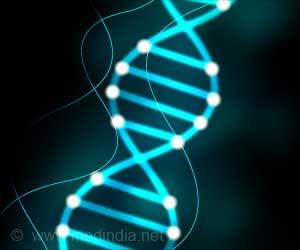- Researchers discover that a special group of genes functioning within the body’s normal DNA repair process are the main reason for the effectiveness of p53, the most important gene in preventing human cancer
- The findings could help doctors better identify patients who have an increased risk of developing certain cancers and help companies develop safer, more effective treatments for patients
"In an exciting and unprecedented finding, we discovered that the DNA repair gene MLH1and additional DNA repair genes are critical to p53's ability to prevent the development of B-cell lymphomas," Dr Janic said.
What is MLH1?
The MLH1 gene codes for the MutL homolog 1, colon cancer, nonpolyposis type 2 (E. coli) protein. It is a gene commonly associated with a genetic condition called hereditary nonpolyposis colorectal cancer that is associated with a high risk of colon cancer and other cancers.DNA mismatch repair (MMR) is a system consisting of seven proteins that recognize and initiate repair of DNA base mismatches; mismatches can arise during DNA replication and recombination. One of the components in the MMR system is the MLH1 protein.
Research has found that a defect in the repair mechanism (which is found in about 13% of colorectal cancers) is due to the deficiency of MLH1 than deficiencies of other MMR proteins.
Study
In the current study, after screening more than 300 downstream targets of p53, the scientists discovered that the loss of the DNA repair gene MLH1 prevented the tumor suppressor gene, p53 from functioning properly, thus causing the development of lymphoma. Tumor development was significantly stalled when MLH1 was put back into the equation.The p53 gene codes for a protein with the same name that plays a pivotal role in the body's natural defense mechanism against cancer and the suppression of tumor formation.
Malfunctioning of the p53 protein is responsible for half of all cancers in the world. Although being aware of the significance of p53, researchers have not been able to explain how the protein is able to block cancer development until now.
The revelation that MLH1 is a powerful weapon for p53 in the fight against cancer could help doctors diagnose patients earlier and prescribe safer, more targeted treatments for their cancer.
The scientists also explored other DNA repair genes to find just how important the whole DNA repair mechanism is to p53's ability to prevent cancer development.
"Now that we understand the significance of MLH1 and other DNA repair factors, we can begin to find ways of identifying the vulnerabilities that their loss may impose on cancer cells with the aim of exploiting these for therapeutic benefit," Dr Janic said.
Future Plans
The next steps will focus on understanding if the DNA repair process has the same cancer-blocking impact on cancers other than lymphoma, such as pancreatic and colon cancers."p53 is mutated in close to 70 percent of colon and pancreatic cancers, so this discovery could have a significant impact on understanding these diseases. We are therefore keen to test whether genes involved in the DNA repair process might also play a role in helping p53 prevent the development of these cancers," she said.
Tumor suppressor gene - p53
p53 is a gene that codes for a protein known as a tumor suppressor protein that is found in the nucleus of all cells in the body that helps regulate normal cell growth and multiplication. Another key function of the p53 protein is the critical role it plays in suppressing tumors by inhibiting the division and growth of cells consisting of damaged DNA.A missing or a damaged p53 gene is the cause of over half of all cancers. The improper functioning of the p53 gene is responsible for cancer’s aggressiveness,response to treatment and its ability to spread to other sites in the body. p53 is a key target for the development of therapy against cancer.
Reference:
- p53 Gene - (http://www.whatisbiotechnology.org/index.php/science/summary/p53-gene)
Source-Medindia










